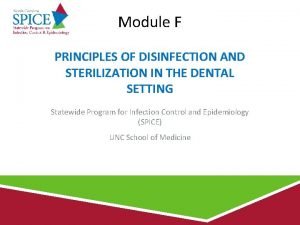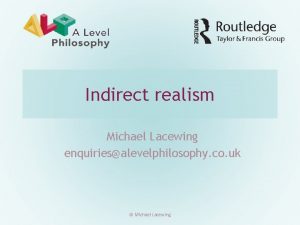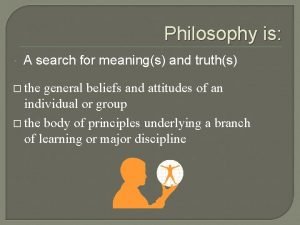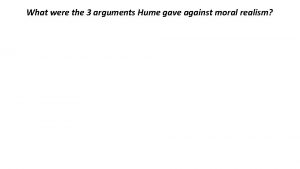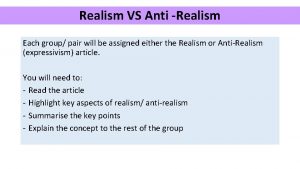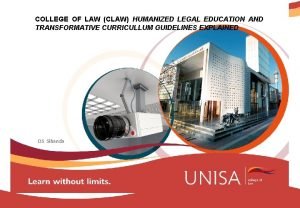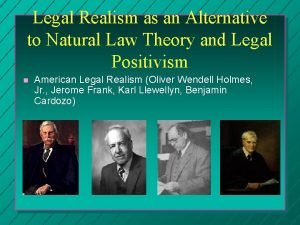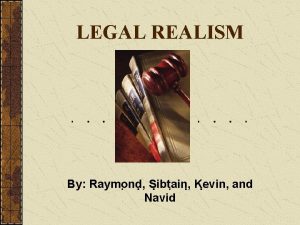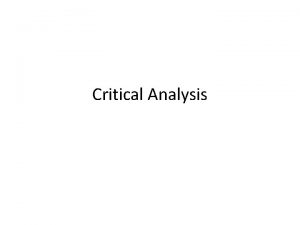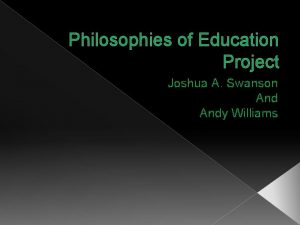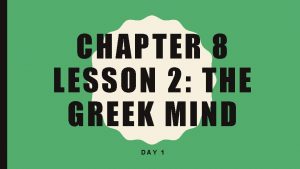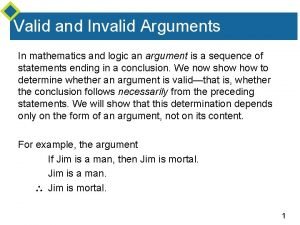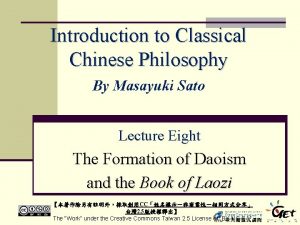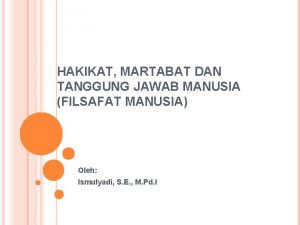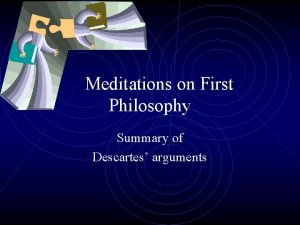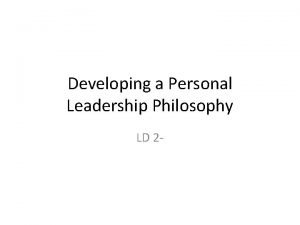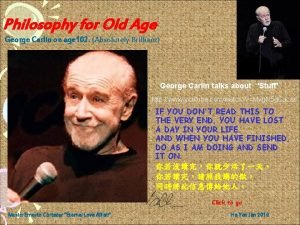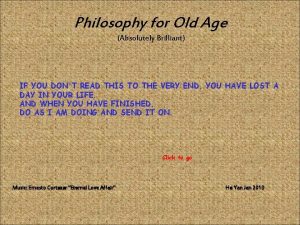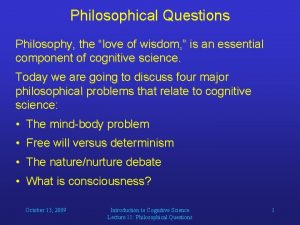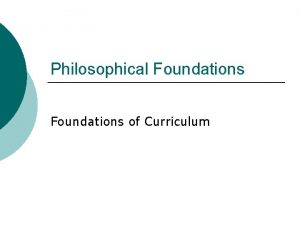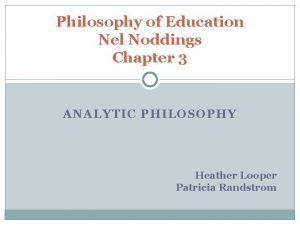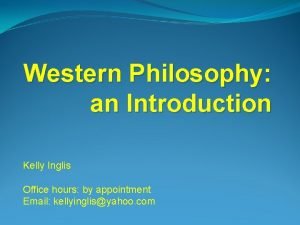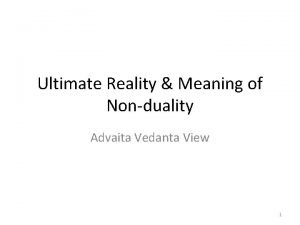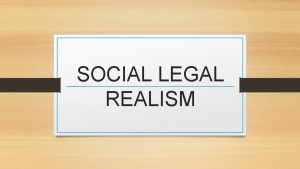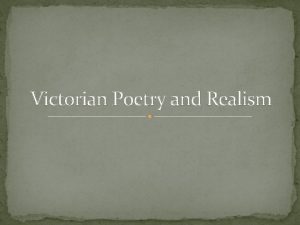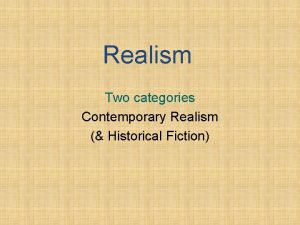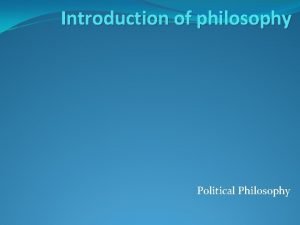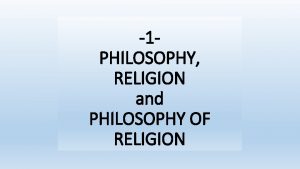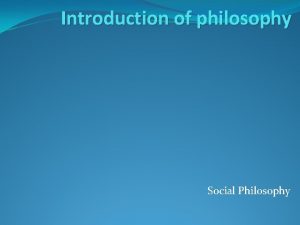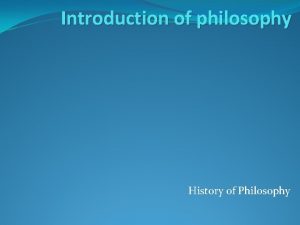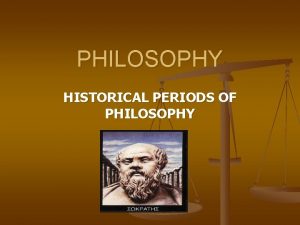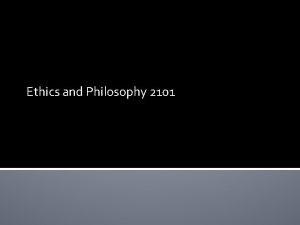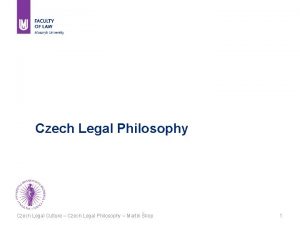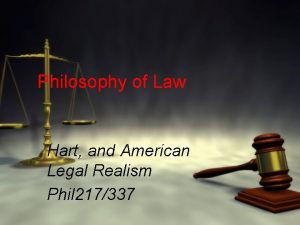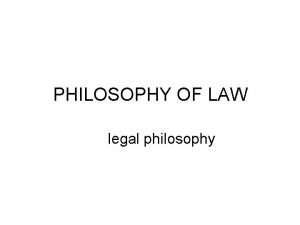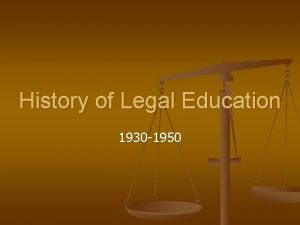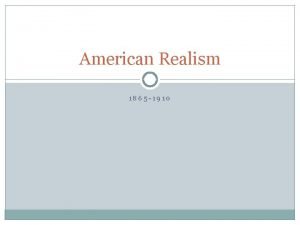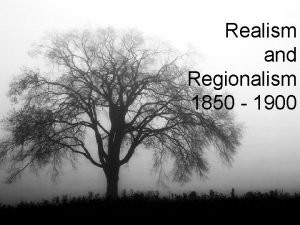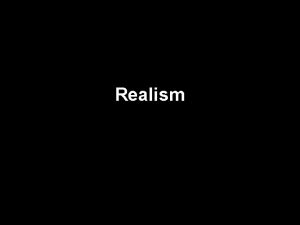CRITICAL LEGAL REALISM Philosophy of Critical Legal Realism






































- Slides: 38

CRITICAL LEGAL REALISM

Philosophy of Critical Legal Realism PROF. ROBERTO MANGABEIRA UNGER Disenchantment with: 1. The elitist tendencies of the dominant liberal paradigm 2. The concealed intentions and judgments behind legal concepts and ideas 3. The system of distribution of the material and social goods is just and in best interest of the people

“social theory is an alternative to Marxism” -Professor Roberto Mangabeira Unger Critics & Polemics against CLR “illegitimate descendants of the modern legal realist school of jurisprudence” -Richard A. Posner “the academic left sub-culture” “not fully understood their animosity and hostility towards liberalism displayed in much of their writings” -Cornel West. “spectacular and even embarrassing failures” -Ronald Dworkin

Deconstruction of DOMINANT LIBERAL PARADIGM Ø Stinging analysis of the traditions, that is to say the ideas, beliefs, attitudes, and propensities of the dominant liberal paradigm Ø Reformation of the traditions of the dominant liberal paradigm through the presentation of the alternative solution

1. Trashing of the Tradition of Dominant Liberal Paradigm State Law organization of the dominant liberal class rationalizing instrument of alienation and oppression yielding concession only when absolutely necessary in order to avoid protests and contradictions Social so divided and hierarchized that status and structure position therein are determined by inequalities

Dominant Liberal Paradigm says § § Critical Legal Realism says The contemporary social order is a Ø Free society is not just. free society for there is individual social division & economic initiative to undertake any business or hierarchies enterprise Ø Free competitive The underlying economic thrust of the conditions contemporary social order in the is exploitive, individualistic control, production, distribution, and possessive. exchange of goods and credit is based monopolies & cartels on free competitive conditions

2. Internal Reformation of the Dominant Liberal Paradigm a. Rationale and Justification for the Censure b. Transformation of the Liberal Legal Order

2. Internal Reformation of the Dominant Liberal Paradigm a. Rationale and Justification for the Censure 1. Rule of Law 2. Separation of Government Power 3. Judicial Activism 4. Popular and Liberal Concepts of Democracy

Plato Administration of a politically organized society should be that of a single person “philosopher-king” Aristotle Rule of law is preferable, regnum (Latin for ‘reign’) or sovereignty of law “government of laws and not of men”

Normative Principle of Rule of Law Contemporary Liberal Critical Legal Realism Society Rule of law is an empty Aristotelian Rule of Law was mechanism for the protection misinterpreted in the hands of liberal of the people. society as a means of making people believe that contemporary liberal Rule of law is an socio-legal order is fair and impartial. inconvenience, a myth to be winked at if not openly mocked Rule of law has become another whenever it stands in the way ideological and rhetorical ruse by which elite coteries within the elite of a mission, a project, or a program coteries within society transmit false consciousness to the already disadvantaged segment of society.

2. Internal Reformation of the Dominant Liberal Paradigm a. Rationale and Justification for the Censure 1. Rule of Law 2. Separation of Government Power 3. Judicial Activism 4. Popular and Liberal Concepts of Democracy

Principle of Checks and Balances To safeguard liberty by preventing the concentration of governmental authority in a single person or body of persons Critical Legal Realism The different governmental branches became the means to power and wealth of the dominant liberal class. Governmental powers are no longer separated To ensure efficiency in the performance of governmental i. e. political accommodations, shifting functions, and to fix alliances, expanded franchises, big responsibility and business in government positions accountability in the exercise of such function

2. Internal Reformation of the Dominant Liberal Paradigm a. Rationale and Justification for the Censure 1. Rule of Law 2. Separation of Government Power 3. Judicial Activism 4. Popular and Liberal Concepts of Democracy

Justice Oliver Wendell Holmes courts cannot enlarge the scope of a statute or rule to include matters which are beyond its text or import Indeterminacy of a statute or rule: 1. Statute or rule is obscure or vague 2. Statute or rule provides inconclusive guidance as to how rights are to be exercised or how obligations are to be performed

Judicial Activism 1. Reflects only the personal or collective prejudices of the judges on what the statute or rule should be 2. An arrogant claim by a few unelected judges of a veto power over legislation 3. The legislators are the representative of the people and politically accountable to them, not the judges with an almost life-time tenure, are the ones to make, modify, or change legislation

Judicial Activism 4. Courts have no advantage over elected legislators and the former are to apply a statute or rule regardless of their disagreement or wisdom 5. Legislative facts and assessment of policy questions are entirely different from judicial facts and consideration of actual cases 6. Courts have no basis to create or contradict a statute or rule merely on advisability

2. Internal Reformation of the Dominant Liberal Paradigm a. Rationale and Justification for the Censure 1. Rule of Law 2. Separation of Government Power 3. Judicial Activism 4. Popular and Liberal Concepts of Democracy

Majoritarian Rule and Theory of Consent Ø Dominant liberal class is able to make its own preferences prevail Ø Awash inapt hope on and misplaced confidence in the majoritarian rule and consent of the governed Ø Control of the government as well as monopoly of the financial, production, commercial and monetary involvements of the country Democratic in form but not in substance

2. Internal Reformation of the Dominant Liberal Paradigm b. Transformation of the Liberal Legal Order 1. Basic Equality 2. Democratic Republicanism

2. Internal Reformation of the Dominant Liberal Paradigm b. Transformation of the Liberal Legal Order 1. Basic Equality 2. Democratic Republicanism

Aristotle Basic equality is fair equality “epekeia”, but full equality is not the answer to social amelioration for this could ruin social life. Dependent on individual effort and merit Legal order should be a neutral instrument in balancing the conflicting or overlapping wants and interests of the different sectors of society

2. Internal Reformation of the Dominant Liberal Paradigm b. Transformation of the Liberal Legal Order 1. Basic Equality 2. Democratic Republicanism

Democratic Republicanism Society and Legal Order Ø Ø No to Social Division and Economic Hierarchy Yes to Universal suffrage Yes to Genuine representative institutions Yes to Freedom of expression

Republican Form of Legal Order can be democratic when supreme power of governance is reposed in the people Elite Form of Legal Order when said power is possessed by or concentrated in a select portion of the people

Transformative Content of Post-Liberal Order Prime considerations: AVOID the post liberal socio-legal order must not fall hostage to any faction therein REALIZE the transformed socio-legal order must be alert for opportunities to eliminate social divisions and economic hierarchies in society.

Deconstruction of DOMINANT LIBERAL PARADIGM b. Transformative Context of the Post-Liberal Order 1. Decentralization of Government 2. Reorganization of Market Economy 3. Reconstruction of System of Rights 4. Nature and Function of Law

Deconstruction of DOMINANT LIBERAL PARADIGM b. Transformative Context of the Post-Liberal Order 1. Decentralization of Government 2. Reorganization of Market Economy 3. Reconstruction of System of Rights 4. Nature and Function of Law

1. Decentralization of Government ELEMENTS: 1. ACCOUNTABILITY. Branches of government, regardless of number, should themselves be designed to be accountable to the people 2. DELEGATION OF POWER. Greater dispersal of governmental powers, functions and resources down to the regional level of society

1. Decentralization of Government ELEMENTS: 3. GOVERNANCE. Quick and clear resolutions of conflicting or overlapping interests among the branches of government 4. FOR THE PEOPLE. Responsible, accountable party government where politics is not insulated from public scrutiny and where governmental positions and offices are not considered as personal entitlements or hereditaments

Deconstruction of DOMINANT LIBERAL PARADIGM b. Transformative Context of the Post-Liberal Order 1. Decentralization of Government 2. Reorganization of Market Economy 3. Reconstruction of System of Rights 4. Nature and Function of Law

2. Reorganization of the Market Economy Economic control resides in the hands of mega-business with interlocking satellite businesses and other forms of economic ventures Medium- and small-scale enterprises become dependent to a large extent on big business

2. Reorganization of the Market Economy Two Constraints: 1. MERGER. merger of domestic entrepreneurs into another hierarchy of market organization 2. OVERPOPULATION. rapid population growth which puts a severe and continuing strain on the economy and natural resources

Deconstruction of DOMINANT LIBERAL PARADIGM b. Transformative Context of the Post-Liberal Order 1. Decentralization of Government 2. Reorganization of Market Economy 3. Reconstruction of System of Rights 4. Nature and Function of Law

3. Reconstruction of the System of Rights The contemporary system of rights and obligations as inadequate in eliminating social divisions and economic hierarchies Right & Obligation -discretionary area of enjoyment of the elite -exceedingly dependency of the underclass to the market mechanism of the dominant liberal class

Entitlements: newer rights to overcome social division and hierarchies 1. Resistance right - gives individual persons authority to strive against and be able to repel interferences with their vital security in the social and economic areas of life 2. Destabilization right - extension of the equal protection of law principle in constitutional law

3. Solidarity right - gives every individual members of society the right to establish areas of reliance among themselves 4. Market right - claim which every member of society make against available social capital established by the state and enables every member of the society to question concentration of concessions of natural resources in one individual or group of individuals

Deconstruction of DOMINANT LIBERAL PARADIGM a. Transformative Context of the Post-Liberal Order 1. Decentralization of Government 2. Reorganization of Market Economy 3. Reconstruction of System of Rights 4. Nature and Function of Law

Function of Law ADVOCACY OF CRITICAL LEGAL REALISM: > Conception of the law that highlights the desirable relation of law to society in general > Law as a neutral and objective means of social control with emphasis on its liberating function.
 Semi critical instruments in dentistry
Semi critical instruments in dentistry Critical semi critical and non critical instruments
Critical semi critical and non critical instruments Indirect realism a level philosophy
Indirect realism a level philosophy Aristotle epistemology
Aristotle epistemology Realism philosophy of education
Realism philosophy of education Realism vs anti realism
Realism vs anti realism Realism vs anti realism
Realism vs anti realism Realism vs anti realism
Realism vs anti realism Characteristics of african legal philosophy (lju4801)
Characteristics of african legal philosophy (lju4801) Legal realism
Legal realism Positive law vs natural law
Positive law vs natural law Natural law vs positive law
Natural law vs positive law Legal realism
Legal realism Sociological jurisprudence adalah
Sociological jurisprudence adalah Critical realism
Critical realism Compare non-critical readers with critical readers.
Compare non-critical readers with critical readers. What is perennialism in philosophy of education
What is perennialism in philosophy of education Thinkers who created new bodies of knowledge
Thinkers who created new bodies of knowledge Invalid argument examples
Invalid argument examples Introduction to classical chinese philosophy
Introduction to classical chinese philosophy Philia sophia vs philia nikia
Philia sophia vs philia nikia Hakikat, martabat dan tanggung jawab manusia
Hakikat, martabat dan tanggung jawab manusia In the lean philosophy, the ideal lot size is
In the lean philosophy, the ideal lot size is Humanists also stressed the importance of the
Humanists also stressed the importance of the Philosophy, politics and economics michael munger
Philosophy, politics and economics michael munger Descartes first meditation summary
Descartes first meditation summary Social work philosophy
Social work philosophy Developing your leadership philosophy classes
Developing your leadership philosophy classes Zaha hadid philosophy
Zaha hadid philosophy George carlin age
George carlin age The philosophy of vishishtadvaita was preached by
The philosophy of vishishtadvaita was preached by Philosophy of old age
Philosophy of old age Philosophical question about love
Philosophical question about love Simulated killing philosophy
Simulated killing philosophy Curriculum trends in perennialism
Curriculum trends in perennialism Analytic philosophy of education
Analytic philosophy of education Radical skepticism
Radical skepticism Unaware of reality meaning
Unaware of reality meaning The science of psychology has its roots in
The science of psychology has its roots in
